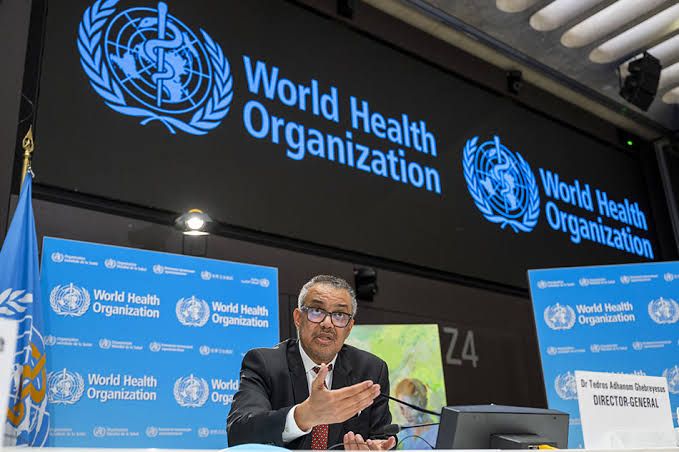Charting the Waters of Dissent: Navigating the Challenges and Implications of Non-Conformity in Global Health Regulations
In the face of a rapidly changing global landscape, societies worldwide are grappling with the novel concept of global health certificates - a measure aimed at curbing the spread of diseases and ensuring public safety. However, the introduction of these certificates has brought to light an issue of equal importance:

In the face of a rapidly changing global landscape, societies worldwide are grappling with the novel concept of global health certificates - a measure aimed at curbing the spread of diseases and ensuring public safety. However, the introduction of these certificates has brought to light an issue of equal importance: the issue of non-conformists. As we stride towards a world where adherence to public health regulations becomes the norm, it's crucial to consider those who, for myriad reasons, resist this new order.
The existence of these non-conformists poses unique challenges that affect the delicate balance between individual freedom, public health, and government control. The possible consequences of their choices and the measures needed to handle their resistance create a diverse range of scenarios that we need to contemplate, understand, and prepare for.
Increased surveillance, the creation of black markets, emergence of social stratification, public pushbacks, protests, forced compliance or isolation, and the development of alternative communities are among the many potential outcomes that our societies may need to navigate. Each of these scenarios not only pose challenges to public health and societal order but also raise ethical and moral dilemmas that require careful thought and nuanced handling.
In the following discussion, we aim to delve deeper into these potential scenarios, to explore the societal, ethical, and practical implications of each, and to consider possible solutions. As we do so, we must remember the importance of preserving individual liberties, respecting diverse perspectives, and ensuring the well-being of all. In a time where the global community's health has become a shared responsibility, the conversation around non-conformity is not merely important—it is crucial.
Chapter 1: The Watchful Eye: The Impact of Increased Surveillance on Non-Conformists
In a society where global health certificates become a ubiquitous part of life, those who refuse to conform – the non-compliant citizens – suddenly find themselves thrust into an unexpected spotlight. The authorities, in an attempt to maintain control and public order, resort to a tool as old as civilization itself: surveillance. But this surveillance in a digital age takes a more intrusive form, sparking off a debate on its implications on privacy, civil liberties, and societal norms.
Modern surveillance has evolved far beyond its primitive forms. It is no longer limited to simple observations or manual tracking. The convergence of technology and big data has transformed surveillance into a sophisticated system capable of tracking people's movements, behaviors, and health statuses in real-time. CCTV cameras equipped with facial recognition, location tracking through smartphones, digital transaction records, social media behavior – all provide a myriad of data points for the authorities to analyze and monitor the non-compliant populace.
For the non-conformists, the increase in surveillance could feel like living in a dystopian reality. Their every move is watched, their every action analyzed. The streets they walk on, the people they meet, the places they frequent, all become threads in a tapestry of data, woven together to predict and control their behavior.
The surveillance state, bolstered by the mandate of public safety, justifies its actions as a necessary measure to contain potential health risks. Penalties for non-compliance, ranging from fines to imprisonment, are justified in the name of public health. In some extreme instances, social exclusion becomes a punitive measure, leading non-conformists to live in a constant state of ostracization.
This dystopian scenario raises grave ethical concerns over privacy and civil liberties. While public safety and health are undoubtedly of paramount importance, it brings into question the cost at which these are achieved. Is the sacrifice of personal privacy and freedom justified in the pursuit of public health? This question underpins the core ethical dilemma faced in this scenario.
Living under the watchful eye of increased surveillance could lead to societal tension and conflict. It could engender feelings of resentment and defiance among non-conformists, giving rise to a vicious cycle of rebellion and surveillance. On the other hand, conformists may feel a false sense of security under the surveillance state, creating a societal divide based on compliance.
As the world grapples with the novel concept of global health certificates, dealing with non-conformists through increased surveillance is a scenario fraught with challenges. Balancing public safety and health with privacy and civil liberties, in a world teetering on the edge of dystopia, remains a pressing concern, pushing us to reflect on the fundamental principles of freedom, privacy, and societal order. The watchful eye of the surveillance state, while ensuring public safety, also casts a long shadow of concern over personal freedom and privacy.
Chapter 2: Shadows in the System: The Emergence of Black Markets
In the looming shadow of a regulated world where global health certificates become an everyday necessity, defiance takes on a new and potentially dangerous form. For those unwilling or unable to conform to this new norm, alternative, and often illicit, solutions present themselves. One such solution manifests in the creation of black markets, places where counterfeit health certificates can be procured. This illegal response to stringent regulations doesn't just challenge authority but also poses a profound threat to public health.
Black markets, synonymous with resistance to regulation and control, are no new phenomenon. From the prohibition era to contemporary digital piracy, black markets have thrived wherever strict rules constrict freedom. The advent of global health certificates provides yet another opportunity for these shadowy enterprises to flourish.
Crafted in the hidden recesses of the underground economy, counterfeit health certificates serve a clientele comprising those who resist the new world order. The reasons behind their resistance vary: ideological opposition to government control, the inability to meet health requirements due to socioeconomic barriers, or a simple desire to live free of any health-based restrictions.
The creation of these forged certificates involves intricate networks of operatives skilled in mimicking official documents and technology-savvy individuals capable of hacking digital systems. Cryptocurrencies often facilitate these clandestine transactions, providing an extra layer of anonymity and making these operations difficult to trace.
However, this rogue solution bears serious consequences. These counterfeit certificates, while offering a sense of false security, pose an alarming risk to public health. Individuals carrying these forgeries, possibly unvaccinated or untested, could move freely in society, increasing the risk of spreading diseases.
This situation creates an urgent task for governments and international organizations. They need to dismantle these networks, track down the counterfeit certificates, and enforce regulations with an iron hand. High-tech solutions may come into play, such as advanced counterfeit detection systems, while traditional investigative techniques and collaboration across borders will also be necessary.
This grim game of cat-and-mouse raises numerous challenges, with authorities constantly having to stay one step ahead of the black market operatives. It also sparks off a debate on the broader socioeconomic conditions that might lead people to seek out these black markets.
In a world of stringent health regulations, the emergence of black markets for counterfeit health certificates stands as a stark reminder of the potential consequences of non-compliance. It underlines the complexities of handling resistance in an increasingly regulated world, forcing us to grapple with the ethical, societal, and public health challenges that arise from these illicit operations. This shadowy defiance against the new norm adds another layer of complexity to our struggle for a safe and healthy global community.
Chapter 3: The Great Divide: Emergence of Social Stratification
In an evolving world where global health certificates become the golden ticket to societal participation, the divide between the compliant and the non-compliant widens, setting the stage for a new form of social stratification. This phenomenon has deep historical roots, with society often classifying its members based on certain criteria, leading to varying levels of rights, privileges, and freedoms. In this modern context, compliance with health regulations becomes the pivotal determinant of an individual's social standing.
For the compliant, this world becomes a relatively open field. The global health certificates serve as their passport to a myriad of rights and freedoms. They can participate fully in society, unrestricted by the health regulations that become a part of daily life. They can travel, engage in social activities, attend educational institutions, and work without significant hurdles. Their compliance, symbolized by their certificates, ensures their place in this new order.
On the other side of this divide are the non-compliant individuals, those who choose not to or cannot adhere to the health regulations. Their non-compliance becomes a significant barrier, often relegating them to the sidelines of society. They might face restrictions on travel, work, education, and even social interactions, essentially making them second-class citizens in a world ruled by health certificates.
This stark distinction between the compliant and the non-compliant has the potential to deepen societal divides, creating a two-tier system that favors the compliant. The implications of this stratification could be far-reaching. It might lead to resentment, conflict, and further social unrest. In the most extreme cases, it might even foster a form of societal segregation, with the compliant and the non-compliant living in distinctly separate social spheres.
Another profound concern stemming from this social stratification is the possibility of widening the gap between different socioeconomic groups. Compliance, in many cases, might be tied to one's economic ability to adhere to health regulations, obtain the necessary vaccines, or access necessary healthcare services. This could lead to a scenario where wealth determines health, further deepening societal inequalities.
The emergence of social stratification based on compliance with health regulations presents a complex challenge to our evolving society. It brings into question our principles of equality, fairness, and inclusivity, pushing us to ponder the societal cost of these new health regulations. Balancing the need for public safety with the tenets of social equality becomes an intricate puzzle that we must solve. In a world increasingly defined by health compliance, the divide between the compliant and the non-compliant stands as a stark reminder of the societal challenges that lie ahead.
Chapter 4: Resistance Rising: Pushbacks and Protests in a Regulated World
In a society anchored by global health certificates and defined by stringent regulations, a subset of the population inevitably rises to challenge the system, sparking off a wave of resistance, protests, and civil disobedience movements. This is the human spirit at its most defiant - pushing back against perceived threats to its fundamental rights and freedoms.
Historically, societies have been marked by their reactions to sweeping changes and increased controls. From the Civil Rights Movement to the recent Black Lives Matter protests, civil disobedience has been a powerful tool for expressing discontent and challenging established norms. In this context, the implementation of global health certificates and increased surveillance provides the catalyst for a new wave of resistance.
These protests can take multiple forms, ranging from peaceful demonstrations and online activism to more disruptive and sometimes even violent confrontations. They may be orchestrated by diverse groups - individuals ideologically opposed to increased government control, those concerned about privacy and civil liberties, or people who feel left behind or marginalized by the new health regulations.
At the heart of these movements is a core belief: the perceived infringement on their civil liberties in the name of public health is unacceptable. Protestors could argue that the new health regulations are an overreach of government power, infringing on their rights to privacy, freedom of movement, and personal autonomy.
While these movements serve as an essential tool for expressing public sentiment and upholding democratic values, they also pose a significant challenge to governments worldwide. Navigating this delicate situation requires a careful balance - governments must strive to maintain public health and order while respecting civil rights and liberties.
This scenario presents several questions to ponder: How can governments ensure public safety without infringing on personal freedoms? How should they respond to these protests? What compromises, if any, should be made?
The emergence of pushback and protests against increased surveillance and control marks a significant shift in societal response to health regulations. It signifies a broader debate on the limits of government control, the value of civil liberties, and the price society is willing to pay for public health. As these resistance movements gain momentum, they highlight the importance of open dialogue, active listening, and flexible policymaking in navigating the complexities of this new regulated world.
Chapter 5: Bridges or Walls: The Dire Choices of Forced Compliance or Isolation
In a world governed by the rules of global health certificates, widespread non-compliance presents an acute dilemma to governments. Faced with the dual challenge of preserving public health and maintaining order, they may resort to drastic measures. The choices they make in these moments of crisis reveal much about the nature of governance and society's tolerance for state intervention. Two such measures, forced compliance and forced isolation of non-conformists, represent two diverging paths that governments could take, each with its own set of profound implications.
Forced compliance represents an assertive approach to non-compliance. Governments could enact policies that mandate compliance with health regulations. This could involve mandatory vaccinations, mandatory testing, or compulsory use of health-tracking applications. In this scenario, non-conformists are compelled to fall in line, and the state's authority is unequivocally asserted. This approach, while potentially effective in achieving widespread compliance, stands as a testament to state power and its ability to override individual autonomy for the greater good.
Forced isolation represents a more extreme, punitive response. Here, non-conformists are not forced into compliance; instead, they are isolated from society. This could mean enforced quarantines, restrictions on movement, or even the creation of separate spaces for non-compliant individuals. This approach is steeped in the principle of protecting the compliant majority from potential health risks posed by the non-compliant minority. Yet, it walks a dangerous line, teetering on the brink of segregation and reinforcing societal divisions.
Both forced compliance and forced isolation represent significant intrusions into personal freedoms, which could further heighten tensions between citizens and the state. They also underscore the philosophical and moral dilemmas that governments face when dealing with non-compliance: Is it acceptable to infringe on individual rights for the greater good? Where should we draw the line between public safety and personal freedom?
These drastic measures, while theoretically effective in dealing with widespread non-compliance, could have far-reaching societal implications. They could deepen societal divisions, foster resentment, and ignite further resistance. Forced compliance and forced isolation represent two potential paths in our journey through an increasingly regulated world. They serve as sobering reminders of the lengths to which governments may go to maintain public health and order, and the challenging choices we as a society may have to face.
Chapter 6: The Road Less Traveled: Development of Alternative Communities
In the labyrinth of a society built on global health certificates and stringent health regulations, non-conformists often find themselves at a crossroads. Caught between compliance and isolation, some may choose a different path, one less dictated by mainstream norms. They may band together, leveraging shared ideologies and mutual discontent to form alternative communities. These communities, defined by their rejection of global health certificates and other regulations, represent a radical form of societal pushback.
These alternative communities are more than just congregations of dissenters. They are manifestations of deep-seated dissatisfaction with the status quo, symbols of resistance against perceived overreach of government control. Operating outside the conventional framework of society, these communities establish their own rules, guided by their shared beliefs and values. They choose autonomy over compliance, freedom over surveillance, and community over isolation.
The formation of these communities is not unprecedented. From the free-spirited communes of the 1960s to the self-sustaining eco-villages of the present, history is replete with examples of alternative communities formed in response to societal discontent. In the context of global health certificates and regulations, these communities represent a rejection of the new health-centric societal order.
While these alternative communities may offer a sense of belonging and freedom for non-conformists, they also present significant challenges, particularly concerning public health. By rejecting health regulations, these communities may become hotbeds for uncontrolled disease spread. Their existence could pose a significant threat to broader public health, requiring careful monitoring and management by health authorities.
Further, these communities might deepen the divide between the compliant and non-compliant, reinforcing societal stratification. They could also become targets of stigma, discrimination, and even aggression from mainstream society, potentially leading to increased social tension and conflict.
The development of alternative communities in response to global health certificates and regulations symbolizes the human spirit's resilience and adaptability. It represents a bold pushback against perceived infringements on personal freedoms and a desire for self-determination.
However, these communities also underscore the complex challenges that societies face in managing public health and social cohesion in an increasingly regulated world. These communities stand as testaments to the societal fault lines exposed by stringent health regulations, reminding us of the need for nuanced, inclusive, and empathetic responses to non-compliance.
Rebels, Innovators, Disruptors: The Non-Conformist Response to Global Health Certificates
"Non-conformists" is a term that broadly describes individuals who choose not to adhere to established or mainstream norms, rules, or expectations. The term carries different connotations in different contexts, but at its core, it signifies a break from conformity and a refusal to abide by expected patterns of thought, behavior, or action.
Non-conformists can be seen as rebels, innovators, or disruptors, depending on the context. In the social realm, non-conformists may be individuals who challenge societal expectations and norms regarding behavior, lifestyle, or values. They may diverge from societal standards in various ways, such as through their dress, speech, or personal beliefs.
In a political context, non-conformists could be individuals who challenge governmental policies or the status quo. They might resist laws or rules they see as unjust or unethical and strive to enact change through various means, including protests, civil disobedience, or advocacy work.
Within the context of our discussion on global health certificates and the potential responses of society, non-conformists are those who refuse to comply with the established health regulations. Their reasons for non-compliance can vary greatly, including skepticism about the efficiency of the certificates, concerns about personal freedoms and privacy, or general defiance towards government control.
It's essential to note that non-conformity isn't inherently negative or positive. On the one hand, non-conformity can lead to innovations, societal progress, and protect individual rights and freedoms. On the other hand, it can also lead to conflict, division, or in the case of health-related matters, potential risks to public health.
Thus, non-conformists play a crucial role in any society, pushing boundaries, challenging established norms, and spurring societal evolution. However, they also present a unique challenge for governance, especially when their actions potentially conflict with public health, safety, or societal cohesion.
The presence of non-conformists underscores the need for flexible and adaptive policies that balance individual freedoms with collective welfare.




